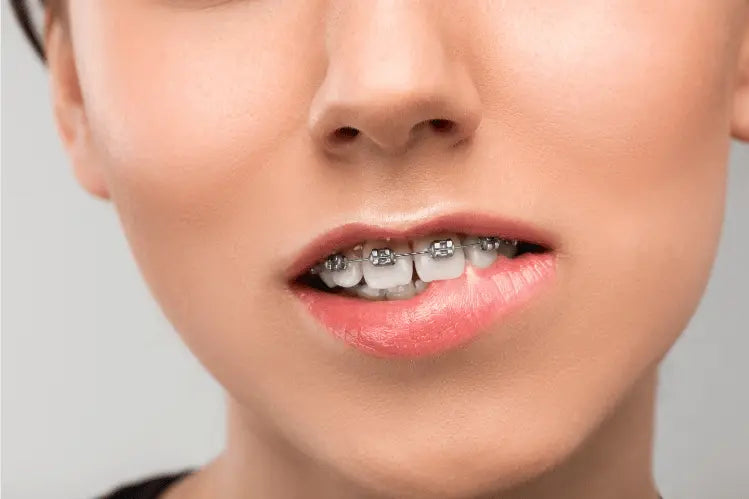Tabla de contenido
Sí, el doloroso trastorno dental conocido como sobremordida dental puede causar malestar y timidez cada vez que sonríes. Pero no temas: en esta publicación de blog, pasaremos directamente al tema de la corrección de la sobremordida. Discutiremos todas las soluciones potenciales, desde alineadores de última generación hasta aparatos ortopédicos y procedimientos quirúrgicos tradicionales. ¡Empecemos!
Entendiendo las sobremordidas
Primero establezcamos un entendimiento común de qué es una sobremordida antes de discutir posibles correcciones. En pocas palabras, una sobremordida es el resultado de una gran superposición entre los dientes frontales superiores e inferiores. Si bien una pequeña sobremordida es común y manejable, los casos más graves pueden causar molestias en la mandíbula, problemas para hablar y problemas estéticos.
Frenos: el fijador superior tradicional
¿Recuerdas aquellos momentos en la escuela secundaria en los que parecía que todos los estudiantes de la clase tenían una boquilla de metal? Sí, esos eran frenillos. Sin embargo, hay una razón por la que son el método original para enderezar los dientes. Los frenillos funcionan moviendo gradualmente los dientes a sus posiciones correctas con la ayuda de brackets y alambres. Puede que no se lleven a casa ningún elogio de la moda, pero aun así hacen el trabajo.
Alineadores: una alternativa discreta
Los alineadores pueden ser la salvación si la idea de tener una sonrisa metálica te hace temblar. Estas bandejas de plástico transparente se deslizan sobre los dientes y los presionan suavemente en su lugar. Además, ¡son casi invisibles! No tienes que decir adiós a tus comidas favoritas porque puedes usarlas como comidas y refrigerios. Simplemente manténgalos tal como se le indicó o es posible que no obtenga el resultado deseado.
Tratamientos quirúrgicos: en caso de que los brackets no sean suficientes
Es posible que se requiera una intervención quirúrgica para lograr el mejor resultado posible en casos de sobremordidas graves o mandíbulas desalineadas. Un cirujano oral y maxilofacial realizará una cirugía ortognática , que implica mover la mandíbula superior e inferior para realinear la mordida. La cirugía puede mejorar significativamente la función y la apariencia, a pesar de ser una opción más invasiva. Aunque los tiempos de recuperación varían, es posible que se necesite reposo y cuidados de seguimiento durante varias semanas.
Seleccionar la mejor opción para usted
La gravedad de su sobremordida, sus circunstancias financieras y sus gustos personales influirán a la hora de determinar la mejor técnica de corrección de sobremordida para usted. Se requiere una consulta con un ortodoncista o cirujano oral calificado para establecer el mejor curso de acción para sus necesidades específicas.
La línea de fondo
Hay varias opciones disponibles para conseguir una sonrisa más recta y saludable con el cuidado de la sobremordida. Elegir la solución de aparatos ortopédicos que mejor se adapte a sus objetivos y estilo de vida es crucial, ya sea que eso signifique someterse a procedimientos quirúrgicos, aparatos ortopédicos tradicionales o alineadores discretos. Un dentista competente puede ayudarle a dar el primer paso hacia una sonrisa más recta y segura.
Preguntas frecuentes
1. Describe una sobremordida y explica por qué debe corregirse.
Cuando hay una gran superposición entre los dientes frontales superiores e inferiores, se llama sobremordida. Si bien una pequeña sobremordida es común, los casos más graves pueden causar molestias en la mandíbula, problemas para hablar y problemas estéticos. A menudo, se requiere corrección para mejorar la apariencia y la funcionalidad.
2. ¿Son los alineadores tan buenos para tratar las sobremordidas como los brackets?
Para sobremordidas leves a moderadas, los alineadores pueden resultar muy útiles; sin embargo, es posible que no sean apropiados para casos graves o desalineaciones complejas de la mandíbula.
3. ¿Cuáles son los beneficios de utilizar alineadores en lugar de aparatos ortopédicos para corregir una sobremordida?
En comparación con los aparatos ortopédicos, los alineadores son casi imperceptibles, se pueden quitar para las comidas y para la higiene bucal y, con frecuencia, son más cómodos de usar.














